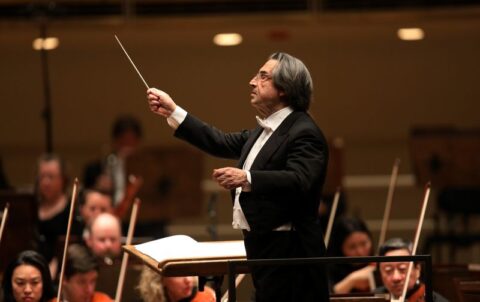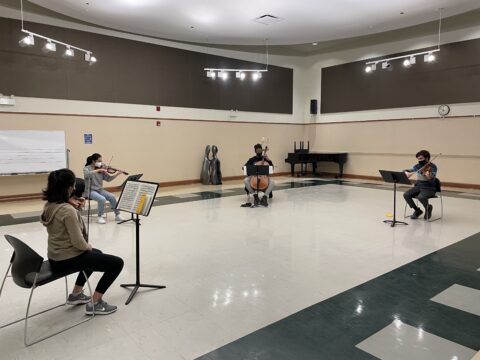ABOVE: The CMPI String Quartet rehearses Verdi’s Quartet in E minor.
This winter, the Chicago Musical Pathways Initiative staff received a remarkable request: Maestro Riccardo Muti, esteemed music director of the Chicago Symphony Orchestra, wanted to coach a quartet made up of CMPI fellows. Thus was born the aptly named CMPI Quartet!

Music Director Riccardo Muti leads the CSO in May of 2019. Photo by Chris Sweda – Chicago Tribune.
The ensemble features violinists Esme Arias-Kim, Ella Saputra, and Sameer Agrawal, as well as cellist Jonathan Miller. Sameer will play viola on their first piece, an instrument he added to his repertoire beginning in seventh grade. All of the fellows are thrilled to have the opportunity to work with Maestro Muti, who Jonathan rightfully calls a “living legend in the world of classical music.”
The group currently is meeting for several in-person rehearsals per month in preparation for their coaching with Muti on March 31. They are being prepared by veteran chamber music coach Sang Mee Lee from the Music Institute of Chicago (MIC).
The quartet has chosen to learn Giuseppe Verdi’s only surviving piece of chamber music, his Quartet in E minor. The piece is a nod to Muti’s famously Italian persona and his widely accepted status as the greatest living interpreter of Verdi’s works. (He studied with Verdi’s personal students, Bruno Bettinelli and Antonino Votto, at the Verdi School of Music in Milan.)

The CMPI Quartet meets, socially distanced, in advance of their March 31 coaching session with Riccardo Muti.
Ella enjoys “the dark, mysterious opening theme…and the interplay between agitation and turbulence with tenderness in this movement,” while Sameer sees even more contrasts: “sometimes feeling slow and luxurious, other times feeling mysterious or brisk and breathless.” For Esme, “It sounds just like an opera with different voices and scenes, and I love creating a storyline for the movement.” As Jonathan says, Verdi’s music transcends time.
Playing in-person chamber music is a delight profoundly missed by all the musicians during the pandemic. For Jonathan, this quartet is the first time he has been able to rehearse in person since the lockdown began over a year ago. Sameer and Esme previously only had monthly in-person chamber music rehearsals through the Academy program at MIC, while Ella is the only quartet member whose program, Midwest Young Artists, has continued to meet weekly in person. Even students who have been able to meet in person have had limitations, such as less frequent rehearsals due to space constraints and, in Sameer’s case, the loss of two months due to a member dropping out and another in quarantine.
Playing in a quartet during a pandemic brings about new challenges. Members must sit further apart and wear face masks, which makes playing and communicating as an ensemble more difficult. The musicians are learning to adjust sound and timing for wider distances between players, and also are modifying cues and other communication strategies to use more visual contact and body movement.
Nonetheless, they have enjoyed the experience. As Esme says, “Being able to play music and connect with others has been a great source of comfort and happiness during the pandemic, and it has been very fulfilling to feel the work and energy we are putting in together as group to reach a final product.”
All of the musicians feel that they really benefit from chamber music training, and expect to further their knowledge through this experience with Maestro Muti. Jonathan emphasizes the need for preparation before rehearsals, as well as compromising with the other musicians. For Sameer, learning all the parts is critical. “You have to be so aware during chamber music…you really get to know the music well.” Ella states that, “Playing chamber music helps you grow as a musician because you learn how to watch and listen to others since you are always leading or following. Chamber music also gives you an opportunity to explore creativity in musical ideas, and improve by receiving constructive criticism from the people you work with.”
Since all of the students in the group are freshmen and sophomores, they hope to continue playing together in the future, and would like to add some new repertoire by composers from traditionally underrepresented backgrounds.
In addition to the CMPI Quartet, the Muti masterclass will feature CMPI oboist Zachary Allen playing the Mozart Oboe Quartet with a group of musicians from the Civic Orchestra of Chicago – the CSO’s famed training orchestra. Families and friends are welcome to watch the coaching session with Maestro Muti on March 31 at 10am via Zoom. Pre-registration is required via this link.
